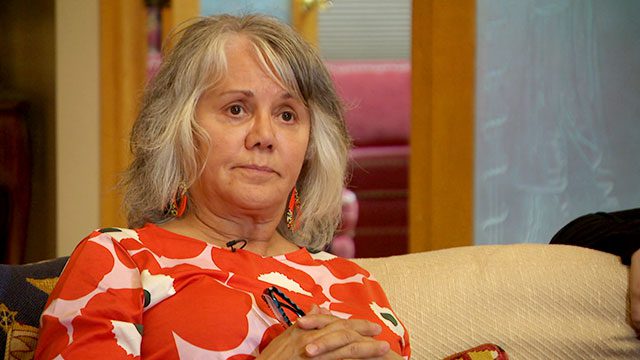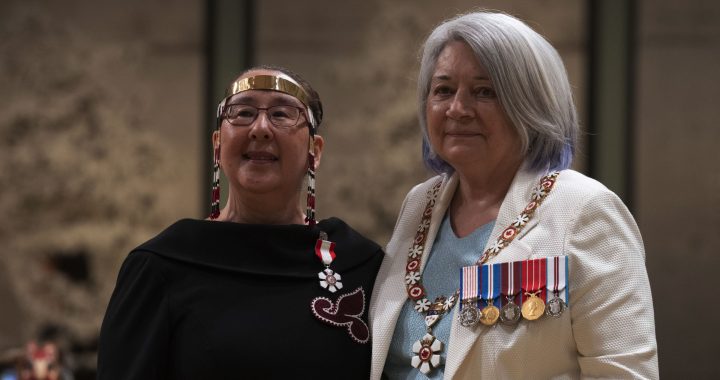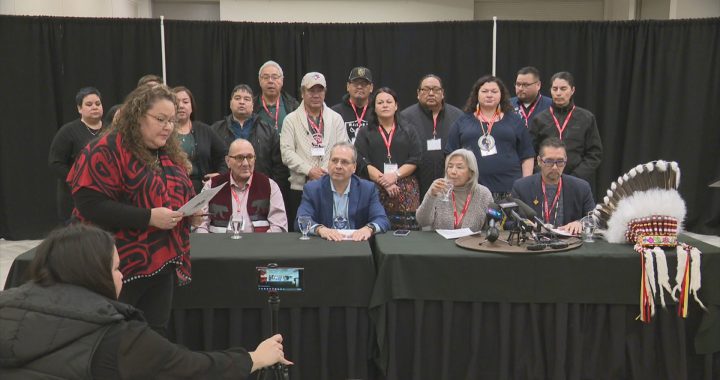

Catherine Twinn is trying to help people she is convinced have a connection to the Sawridge First Nation community become band members.
She is the widow of the long-time Sawridge chief, Walter Twinn.
He passed away in 1997, after presiding over an economic boom in his northern Alberta community as a result of oil and gas discoveries as well as skillful investment of revenues in hotels and other business ventures.
Catherine Twinn defended the Sawridge membership policies for decades. So it was surprising when she contacted APTN Investigates earlier this year to say she’d “done a 360” and now believes the band’s approach is wrong.
She believes people with strong blood ties to the community should have an opportunity to share in the wealth of two trust funds that court documents say are worth in excess of $140 million.
The band has been in court since 1985 fighting over membership issues.
Twinn has argued in court that the chief and council have allowed politics to influence decision-making on membership applications.
Chief Roland Twinn, the current Sawridge chief and son of Walter, declined our requests for an interview.
The Indian Act is also making it difficult for Catherine and the people she is trying to help.
In Section 10, the federal government gave away the right to decide who gets to be a member of a band.
The band council has total control and there is no right to appeal the band’s decisions to the federal government.
Catherine Twinn says Canada, by taking this step, has abandoned grassroots First Nations citizens by ceding its oversight powers to band councils.
For its part, Canada says it is respecting the inherent right of self-government.
But Twinn says Canada has done it for self-serving reasons.
“In my opinion, since the Guerin decision, Canada has sought to mitigate its fiduciary risk. Downloading the colonial mess by passing federal power to chiefs and councils is one way to mitigate the federal fiduciary risk,” she says.
In Guerin v the Queen, a decision handed down by Canada’s highest court in 1984, the Supreme Court ruled that the federal government must pay financial damages to the Vancouver-area Musqueam band because government officials had cheated the band out of profits from a land surrender.
The court based that decision on Canada’s fiduciary or trust-like responsibility to First Nations.
Twinn and others told APTN she was told by informed sources that Guerin sent shock waves through the entire federal bureaucracy and fundamentally changed the government’s approach to dealing with First Nations.
Bay Street Lawyer and Queen’s University law professor Mark Ellis wrote Fiduciary Duties in Canada, the go-to legal resource on fiduciary law for lawyers and corporate officers in the country.
“Simply put, fiduciary obligation is a duty to act selflessly as opposed to selfishly. It’s the highest duty known to law,” he says.
“And in particular, what’s unique about the fiduciary obligation in Canada is that Canada is the only country that has constitutionally recognized the obligation of fiduciary selflessness towards a people. And that is the Indigenous people of Canada. It’s institutionalized in our very constitution — the duty to act selflessly towards indigenous people and their lands in Canada.”
Canada’s fiduciary obligation was born in the Royal Proclamation of 1763 and codified in the British North America Act of 1867.
Guerin served as a reminder – from the court to the government – of the high level of responsibility it owed to First Nations.
Government officials got the message that the courts would hold them accountable for upholding that duty.
But ever since the decision was released, First Nations leaders have complained about the quality of Canada’s “selflessness,” saying federal officials still put the government’s interests first.
Twinn says that when the Supreme Court issued its reminder in Guerin, federal officials started looking for a way to minimize their obligation. Others with long experience working on behalf of First Nations confirm that they saw this unfold as well.
Before he ran for national chief in 2018, Russell Diabo worked on staff at the Assembly of First Nations (AFN) and now earns his living as an advisor and consultant to First Nations on dealing with the federal government. He has been an active part of the federal and First Nations relationship for decades.
He saw a direct link to Guerin and a change in direction on the government’s part.
“The government became very concerned about the financial implications of being, you know, held to a fiduciary obligation,” he says.
Cambridge, Ont. based lawyer Eric Hovius began his career with the federal government and now specializes in Aboriginal law. He says the fear of violating the fiduciary duty has a daily, almost constant effect, on the decision-making of government officials.
“What I have found is that the policies that are in place are generally risk adverse. I found that any time that the federal government is potentially making a decision that would then kick in the fiduciary duty owed to First Nations, they’re a lot less likely to permit certain forms of development,” he explains.
“It’s not necessarily a negative thing because it does allow a certain amount of self-government, and I think that’s important. But I think the underlying basis for why it’s being done is basically to avoid being saddled with the fiduciary duty. So I would describe it as sidestepping their fiduciary duty or minimizing their fiduciary duty by passing it on to the community members themselves.”

“I found that any time that the time that the federal government is potentially making a decision that would then kick in the fiduciary duty owed to First Nations, they’re a lot less likely to permit certain forms of development,” says lawyer Eric Hovius. Photo: APTN News.
Twinn argues that devolution of federal power and authority to First Nations governments, without developing the proper checks and balances and accountability structures, opens the door for bands to ignore procedural fairness and leaves the governed on First Nations at the mercy of the governors.
Hovius agrees.
“I think that with the policies and the regulations and the legislation that’s come into place, the federal government is trying to essentially pass on the responsibility of being a fiduciary, and they’re doing it by giving local control over decisions that they would otherwise have been required to make,” he says. “And I think the spirit of the idea of that is good, but I do share the concern that the federal government is handing over portions of its role that they had agreed to act in the best interest of First Nations.”
Roland Pangowish was the AFN’s director of Lands and Trust Unit for 12 years. He worked for four national chiefs and helped develop the United Nations Declaration on the Rights of Indigenous Peoples (UNDRIP).
He sees the way Canada approaches its fiduciary duty to be a major issue that doesn‘t get nearly enough attention.
“One of the big things I see is a conflict of interest on the Crown’s part when they have fiduciary obligations to First Nations, and when it comes to land rights or resource issues often our interests clash with the general public’s issues, the constituents of the government MPs who form the government,” he says.
“I find they… just use that conflict of interest. They work things to their advantage. And that’s why we can’t get anywhere.”

Roland Pangowish says the way Canada approaches its fiduciary duty is a major issue that doesn‘t get nearly enough attention. Photo: APTN News.
Pangowish isn’t sure the court’s message in Guerin was received.
“The [fiduciary] standard of conduct is much higher than in a trust where beneficiaries are instructing trustees. In this case there’s no instruction. So it’s done unilaterally so the standard of conduct should be higher, but it’s even lower and they’re lowering it,” he says. “So there needs to be some sort of independent mechanism brought in where the government cannot manipulate negotiations, cannot manipulate compensation, cannot dictate the parameters and process of negotiation.”
Montreal-based lawyer David Schulze has taken many of the most high profile Indigenous rights cases to court in recent years.
He also sees the government downloading its highest legal obligation.
“Direct interference of the kind that was common right into the 1960s, with the Indian agent sitting at every council meeting and telling people what to decide . . . I think that’s gone,” he says.
“And that came out of two simultaneous phenomena. One was that there was a lot of agitation and political pressure for communities to take control of their own programs and services. And the other one, is that the courts were starting to say that the Crown was responsible for the decisions it made for bands, financially responsible when they went wrong. So then it really wasn’t in the Crown’s interest to make decisions anyway because if they got it wrong they’d be on the hook.
The flip side being if you say it was all the band’s decision, well then any losses are their problem too.”
Downloading decision-making and governance without certain preparations can lead to trouble, Schulze says.
“The issue, though, becomes all this takes place in a context of under funding and the very weak governance regime that is the Indian Act,” he says.
He sees another possible conflict in the Crown’s stance on Section 10 membership.
“The payoff of course for Indian Affairs – and this is really important – the payoff for Indian Affairs is that if a band is less generous with membership than the Indian Act is, that community will have fewer members on reserve asking for programs and services. So Indian Affairs saves money,” he says.
Twinn’s fight continues. She calls on chiefs and councils to step up and overcome the flaws in the governance system. She says many chiefs are doing this.
“They understand the requirement for nation rebuilding. They know that inequality is bad for everyone and that almost every modern social problem is more likely to occur in a less-equal society. So they want to build a society founded on equality and spiritual values,” she explains.
“But other elected leaders do not know this. Power, in their hands, is treated as absolute, personal power. It’s cut loose from standards of procedural fairness, principles of justice, equality, transparency, accountability and fiduciary selflessness. The inherent right of self-government does not justify absolute power and harming people.”
She has spent time lobbying in Ottawa for those she is trying to help. She says many parliamentarians are aware of the problem.
“But they look away. They don’t want to interfere or appear colonial. They defer to the inherent right of self-government. They look good and it mitigates the federal fiduciary risk,” she says.
Twinn says Senators and MPs who say there is redress for grassroots citizens within the system aren’t painting a full picture.
“These deflectors say that those harmed can seek redress from a court or a human rights tribunal. Few can afford to access justice, navigate the process — and in any event, these judicial bodies cannot deliver remedies that solve complex, bad governance problems,” she says.
“What can help solve these complex problems is vigilant fiduciary oversight, not abdication.”










